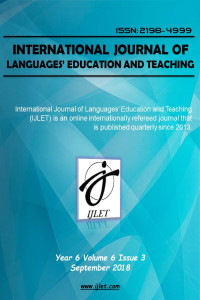Öz
It is a well-known the fact that microblogging has gradually increased its popularity all over the world since the launch of Twitter in 2006. Nevertheless, research on the effects of the site on language learning keeps paltry. Today's’ learners who were born after roughly 1980 are called ‘digital native’ (Prensky, 2001), and they are exposed to digital technology more than eight hours a day. Bearing this fact in mind, we as teachers, who are named ‘digital immigrants’, had better catch up with them one way or another. Twitter, well- appreciated microblogging site by young generations, is examined in this study to clarify its effects on English language learners’ academic success. Because of the nature of the site, writing activities and learners’ academic success on writing are addressed through the study. This particular study is designed as an experimental one in which 63 prep class students of a state university in Turkey constituted experimental and control group. The students in the experimental group were asked to follow instructions, ‘Twitter hashtags’ which were given by the teacher in the light of the courses covered in the class for ten weeks. For example, with #DreamJobs heading, the students were required to write English sentences about their dream jobs, and throughout the study, the teacher provided immediate feedback to those sentences. The control group students continued their usual learning process without any intervention of Twitter use. Writing achievement test was implemented both to the experimental and the control group at the beginning and end of the term. Pre and post test scores of the students were analyzed by using T-test scale in SPSS. The results emerged at the end of the study revealed substantial effects of Twitter use on EFL students’ overall academic success in writing. Accordingly, Twitter use is highly recommended to be implemented into the curriculum.
Anahtar Kelimeler
Microblogging Twitter English language learning writing performance academic success
Kaynakça
- Acar, A., & Kimura, N. (2012). Twitter as a tool for language learning: The case of Japanese learners of English. Special Issue of International Journal of the Computer, the Internet and Management, 19, 1 14.
- Acosta, D. M. (2014). Tweet Up? Examining Twitter's impact on social capital and digital citizenship in higher education. About Campus, 18(6), 10-17.
- Asphen, E. J., & Thorpe, L. P. (2009). Where do you learn? Tweeting to inform learning space development. Educause Quarterly, 32 (1).
- Benito-Ruiz, E. (2009). Infoxication 2.0. In M. Thomas (Ed.), Handbook of research on Web 2.0 and second language learning (pp. 60-79). Hershey, PA; Information Science Reference
- Borau, K., Ullrich, C., Feng, J., & Shen, R. (2009). Microblogging for language learning: Using twitter to train communicative and cultural competence. In Advances in web based learning–ICWL 2009 (pp. 78-87). Springer Berlin Heidelberg.
- Carpenter, J. P., & Krutka, D. G. (2014). How and why educators use Twitter: A survey of the field. Journal of research on technology in education, 46(4), 414-434.
- Dunlap, J. C., & Lowenthal, P. R. (2009). Tweeting the night away: Using Twitter to enhance social presence. Journal of Information Systems Education, 20(2), 129.
- Grosseck, G., & Holotesco, C. (2008). “Models good pedagogy responsive to student’s learning needs,” The 4th International Scientific Conference eLSE: eLearning and Software for Education, Bucharest, Apr. 17–18, 2008.
- Gündüz, N. (2005). Computer assisted language learning. Journal of Language and Linguistic Studies, 1(2).
Öz
Anahtar Kelimeler
Microblogging Twitter English language learning writing performance academic success
Kaynakça
- Acar, A., & Kimura, N. (2012). Twitter as a tool for language learning: The case of Japanese learners of English. Special Issue of International Journal of the Computer, the Internet and Management, 19, 1 14.
- Acosta, D. M. (2014). Tweet Up? Examining Twitter's impact on social capital and digital citizenship in higher education. About Campus, 18(6), 10-17.
- Asphen, E. J., & Thorpe, L. P. (2009). Where do you learn? Tweeting to inform learning space development. Educause Quarterly, 32 (1).
- Benito-Ruiz, E. (2009). Infoxication 2.0. In M. Thomas (Ed.), Handbook of research on Web 2.0 and second language learning (pp. 60-79). Hershey, PA; Information Science Reference
- Borau, K., Ullrich, C., Feng, J., & Shen, R. (2009). Microblogging for language learning: Using twitter to train communicative and cultural competence. In Advances in web based learning–ICWL 2009 (pp. 78-87). Springer Berlin Heidelberg.
- Carpenter, J. P., & Krutka, D. G. (2014). How and why educators use Twitter: A survey of the field. Journal of research on technology in education, 46(4), 414-434.
- Dunlap, J. C., & Lowenthal, P. R. (2009). Tweeting the night away: Using Twitter to enhance social presence. Journal of Information Systems Education, 20(2), 129.
- Grosseck, G., & Holotesco, C. (2008). “Models good pedagogy responsive to student’s learning needs,” The 4th International Scientific Conference eLSE: eLearning and Software for Education, Bucharest, Apr. 17–18, 2008.
- Gündüz, N. (2005). Computer assisted language learning. Journal of Language and Linguistic Studies, 1(2).
Ayrıntılar
| Birincil Dil | İngilizce |
|---|---|
| Konular | İkinci Bir Dil Olarak İngilizce |
| Bölüm | Araştırma Makalesi |
| Yazarlar | |
| Yayımlanma Tarihi | 30 Eylül 2018 |
| Yayımlandığı Sayı | Yıl 2018 Cilt: 6 Sayı: 3 |


